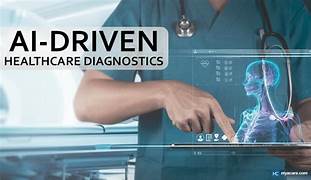How Can AI Help with Healthcare Diagnostics?
Artificial Intelligence (AI) has emerged as a transformative force in numerous industries, and healthcare is no exception. One of the most impactful areas where AI is making strides is in healthcare diagnostics. By leveraging AI’s ability to process vast amounts of data quickly and accurately, medical professionals can enhance diagnostic precision, improve patient outcomes, and streamline the overall healthcare process. This article delves into how AI is reshaping healthcare diagnostics, the benefits it offers, and the challenges it faces.
The Role of AI in Healthcare Diagnostics
AI technologies, particularly machine learning and deep learning, excel at analyzing large datasets to identify patterns and anomalies that might escape human observation. In healthcare, these datasets often include medical imaging, electronic health records (EHRs), genomic information, and more. AI systems can process this information to:
- Detect Diseases Early: Early diagnosis is crucial for diseases like cancer, diabetes, and cardiovascular conditions. AI algorithms trained on extensive datasets can identify early warning signs, enabling timely interventions.
- Enhance Imaging Analysis: Radiology and imaging diagnostics are among the most advanced applications of AI. AI tools can analyze X-rays, MRIs, CT scans, and mammograms to detect abnormalities such as tumors or fractures with remarkable accuracy.
- Personalize Patient Care: By integrating AI with genomics and patient history, healthcare providers can develop tailored treatment plans. For example, AI can predict how a patient might respond to specific medications.
- Predict Outcomes: AI models can forecast disease progression and potential complications based on patient data, helping doctors prepare better treatment strategies.
- Support Under-Resourced Areas: In regions with limited access to specialists, AI tools can serve as a critical resource. For instance, AI-powered mobile apps can help diagnose skin conditions or respiratory illnesses remotely.
Key AI Applications in Diagnostics
1. Medical Imaging
Medical imaging is one of the most prominent areas where AI has demonstrated its capabilities. AI algorithms are now being used to:
- Detect Cancer: AI systems like Google’s DeepMind and IBM Watson Health have shown exceptional accuracy in identifying breast cancer, lung nodules, and other malignancies in medical images.
- Diagnose Neurological Disorders: AI tools can analyze brain scans to identify early signs of Alzheimer’s, Parkinson’s, and other neurological conditions.
- Cardiology: AI can interpret echocardiograms and angiograms to identify heart defects, blockages, or abnormalities.
2. Pathology
In pathology, AI assists in analyzing tissue samples more quickly and accurately. AI-powered digital pathology systems can:
- Identify cancerous cells in biopsy samples.
- Automate the detection of infectious diseases like tuberculosis and malaria.
- Reduce human error in complex diagnostic tasks.
3. Genomics and Precision Medicine
AI is revolutionizing the field of genomics by:
- Accelerating the interpretation of genetic data to identify mutations linked to diseases.
- Enabling precision medicine by predicting a patient’s response to treatments based on their genetic makeup.
4. Remote Diagnostics and Telemedicine
AI plays a vital role in telemedicine by:
- Enabling remote patient monitoring through wearable devices that track vital signs like heart rate, oxygen levels, and glucose levels.
- Diagnosing common conditions via AI-powered chatbots and apps that use symptom-checking algorithms.
Benefits of AI in Healthcare Diagnostics
1. Improved Accuracy
AI can significantly reduce diagnostic errors by analyzing data with a level of detail and consistency beyond human capability. For instance, AI algorithms trained to detect breast cancer have outperformed some radiologists in identifying tumors on mammograms.
2. Time Efficiency
AI accelerates the diagnostic process by analyzing data in seconds. This efficiency is especially beneficial in emergency situations where timely decisions can save lives.
3. Cost Reduction
By automating routine tasks and reducing errors, AI can lower healthcare costs. For instance, earlier and more accurate diagnoses can prevent the need for expensive treatments later.
4. Increased Accessibility
AI tools can provide diagnostic support in areas with a shortage of specialists. Mobile applications and portable AI devices make quality healthcare more accessible globally.
5. Continuous Learning and Improvement
AI systems improve over time as they are exposed to more data. This continuous learning enhances their diagnostic accuracy and adaptability to new medical challenges.
Challenges of AI in Healthcare Diagnostics
While the potential of AI in diagnostics is immense, several challenges must be addressed:
1. Data Quality and Bias
AI models are only as good as the data they are trained on. Poor-quality or biased data can lead to inaccurate diagnoses, disproportionately affecting certain populations.
2. Integration with Existing Systems
Integrating AI into current healthcare workflows and EHR systems can be complex and resource-intensive.
3. Regulatory Hurdles
AI tools must comply with stringent regulatory standards to ensure patient safety and data security. The approval process for medical AI devices can be lengthy.
4. Ethical Concerns
AI systems raise ethical questions about data privacy, informed consent, and the potential for misuse of sensitive patient information.
5. Reliability and Accountability
Determining accountability when an AI system makes a diagnostic error is a critical concern. Healthcare providers and developers must establish clear guidelines for AI use.
The Future of AI in Diagnostics
The future of AI in healthcare diagnostics is promising. Advances in technology, such as natural language processing, explainable AI, and quantum computing, are expected to enhance the capabilities of AI systems further. Collaborative efforts between AI developers, healthcare professionals, and regulatory bodies will play a crucial role in overcoming challenges and ensuring the safe, effective implementation of AI in diagnostics.
Moreover, as AI becomes more accessible, it has the potential to democratize healthcare, making high-quality diagnostic services available to underserved populations worldwide. The combination of AI with wearable devices, telemedicine, and real-time analytics will likely lead to a more proactive and personalized approach to healthcare.
Conclusion
AI is revolutionizing healthcare diagnostics by improving accuracy, efficiency, and accessibility. From analyzing medical images to interpreting genetic data, AI tools are enabling earlier detection, personalized care, and better patient outcomes. However, addressing challenges like data quality, regulatory compliance, and ethical concerns is essential to fully realize AI’s potential.
As technology continues to evolve, the integration of AI into healthcare diagnostics will undoubtedly become more seamless and impactful. By embracing AI responsibly, the medical community can enhance the quality of care and pave the way for a healthier future.


